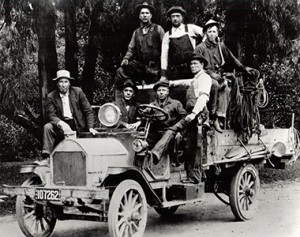Charles Drolette, president of the IBEW Pacific District Council, met privately with PG&E officials in October in an effort to settle the strike. Paul M. Downing, representing PG&E, seemed interested in getting linemen back to work, but was not open to any official negotiations.
At the November 1913 convention of the Pacific District Council, Drolette spoke against “ill-advised warfare” and pleaded for a settlement of the strike. He tried to focus attention on helping members who faced prison time for strike-related offenses. But convention delegates ignored Drolette and instead passed resolutions denouncing the McNulty IBEW for scabbing on the PG&E strikers.
The California Federation of Labor voiced continued support for the strike at its October convention, but American Federation of Labor President Samuel Gompers steadfastly opposed the strike and administered the coup de grâce at the national AFL convention in November. After screaming matches on the convention floor, delegates passed resolutions opposing the Reid IBEW and formally endorsed the McNulty IBEW contract with PG&E.
Gompers and McNulty came directly to San Francisco from the AFL convention. Strike leaders recognized their cause was lost, but insisted that all strikers be allowed to vote on the matter. On January 12, 1914, members of 17 local unions in the Light and Power Council voted to call off the PG&E strike.
James R. Reid, head of the Reid IBEW, did not survive the strike he inspired. His mental health had deteriorated in 1913 and he was committed to a state hospital in Pennsylvania. He died soon thereafter.
